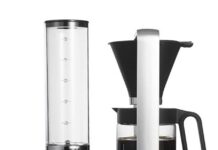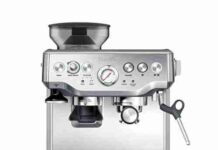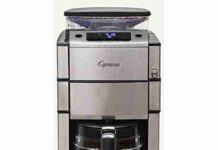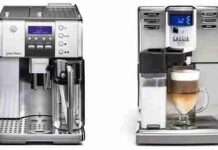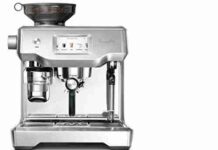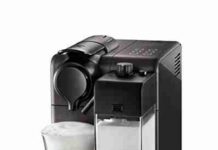Have you ever experienced the frustrating situation of your coffee maker overflowing or spilling out coffee grinds? It can be quite a mess to clean up, not to mention a waste of precious coffee. In this article, we will explore the common reasons behind this coffee catastrophe and provide some tips on how to prevent it from happening again. So, grab a cup of your favorite brew and let’s delve into the world of coffee maker mishaps.
Water Level Issues
Insufficient Water
One common reason for a coffee maker to overflow or spill out coffee grinds is due to an insufficient water level. When there isn’t enough water in the reservoir, the machine tries to brew with whatever little water it has, resulting in incomplete extraction and a higher chance of overflow. To avoid this issue, it is important to always ensure that the water level in your coffee maker is sufficient before starting the brewing process.
Excessive Water
On the other hand, excessive water can also lead to overflow or the spilling out of coffee grinds. When the water level exceeds the capacity of the coffee maker, it can cause the brewing process to be disrupted and result in a messy coffee-making experience. It is crucial to follow the recommended water level guidelines provided by the manufacturer to prevent unnecessary overflow.
Coffee Ground Issues
Incorrect Coffee Grind Size
Using the incorrect coffee grind size can contribute to the overflow or spilling out of coffee grinds. If the coffee grounds are too fine for your coffee maker, they can clog the filter, causing an obstruction in the brewing process and potentially leading to overflow. Conversely, using coffee grounds that are too coarse may result in water passing through too quickly, causing the coffee maker to overflow. It is essential to check the coffee grind size recommended for your specific coffee maker and adjust accordingly.
Overfilled Coffee Filter
Overfilling the coffee filter can also lead to overflow or the spilling out of coffee grinds. When the coffee filter is packed with too much coffee, there is not enough room for water to flow through, causing the brewing process to become congested. This can result in overflow, as the excess water has nowhere to go. It is advisable to follow the manufacturer’s recommendations for the right coffee-to-water ratio and avoid overfilling the coffee filter to prevent any potential spills.
Clogged or Dirty Components
Clogged Water Line
A clogged water line can significantly impact the brewing process and potentially cause overflow or the spilling out of coffee grinds. Mineral deposits, coffee residue, or other debris can accumulate in the water line over time, obstructing proper water flow. This can lead to pressure build-up and disruption during brewing, resulting in overflow. Regularly cleaning and descaling your coffee maker can help prevent clogs and ensure smooth operation.
Clogged Dispenser Nozzle
A clogged dispenser nozzle can also contribute to the overflow or spilling out of coffee grinds. The dispenser nozzle is responsible for directing the brewed coffee into the pot or cup. If this nozzle becomes clogged with coffee grounds or other debris, it can hinder the flow of coffee and cause overflow. Cleaning the dispenser nozzle regularly and ensuring it is free from any obstructions is essential to avoid this issue.
Dirty Coffee Filter
Using a dirty coffee filter can lead to overflow or the spilling out of coffee grinds. Over time, coffee oils and residue can build up in the filter, causing it to become clogged. When the filter is clogged, water cannot pass through freely, leading to overflow or a messy brewing process. It is crucial to regularly clean or replace the coffee filter to maintain optimal brew performance and prevent any potential spills.
Malfunctioning or Misused Parts
Faulty Water Level Sensor
A malfunctioning water level sensor can cause issues with water measurement and result in overflow or the spilling out of coffee grinds. The water level sensor is responsible for detecting the water level in the reservoir and signaling the brewing process to start. If this sensor is faulty or incorrectly calibrated, it may inaccurately detect the water level, leading to an overflow situation. If you suspect a faulty water level sensor, it is advisable to contact the manufacturer for assistance or consider getting it repaired or replaced.
Damaged Brewing Basket
A damaged brewing basket can contribute to overflow or the spilling out of coffee grinds. If the brewing basket is cracked, bent, or otherwise damaged, it may not properly contain the coffee grounds during brewing. This can result in overflow as the grounds escape the basket and enter other parts of the coffee maker. Regularly inspecting and replacing any damaged brewing baskets is important to prevent such issues from occurring.
Incorrect Assembly
Incorrect assembly of the coffee maker components can also lead to overflow or the spilling out of coffee grinds. If the parts are not properly aligned or securely connected, it can disrupt the brewing process and cause leaks or overflow. Following the manufacturer’s assembly instructions closely and ensuring all components are correctly fitted can help avoid mishaps and messy situations during brewing.
Brewing Process Problems
Improper Drip Rate
An improper drip rate during the brewing process can result in overflow or the spilling out of coffee grinds. If the coffee maker is designed to release a specific amount of water per minute, a deviation from this rate can cause overflow. If the water flows too fast, the coffee grounds may not have enough time to properly absorb the water, leading to a higher chance of overflow. Conversely, if the water drips too slowly, it can cause the water to back up, resulting in a messy brewing experience. Ensuring that the drip rate is aligned with the manufacturer’s specifications can help prevent overflow.
Uneven Heat Distribution
Uneven heat distribution within the coffee maker can contribute to the overflow or spilling out of coffee grinds. If certain areas of the coffee maker heat up more than others, it can cause an imbalance in the brewing process. This can result in water overflowing from one area while leaving the coffee grounds under-extracted in other parts. Ensuring proper maintenance and regular cleaning of your coffee maker can help maintain optimal heat distribution and prevent any brewing mishaps.
Improper Handling or Care
Moving/Shaking During Brewing
Moving or shaking the coffee maker during the brewing process can lead to overflow or the spilling out of coffee grinds. Sudden movements can disrupt the brewing process and cause water to escape from the coffee maker, resulting in a messy situation. It is important to keep the coffee maker on a stable surface during brewing and avoid any unnecessary movements to prevent overflow.
Failure to Clean Regularly
Neglecting regular cleaning of the coffee maker can contribute to overflow or the spilling out of coffee grinds. Over time, coffee oils, residue, and mineral deposits can accumulate within the machine, leading to clogs and disruptions during brewing. Regularly cleaning your coffee maker, descaling when necessary, and following the recommended maintenance schedule can help prevent overflow and ensure a smooth brewing process.
Inadequate Maintenance
Lack of Descaling
A lack of descaling can contribute to overflow or the spilling out of coffee grinds. Mineral deposits from hard water can build up within the coffee maker, obstructing water flow and disrupting the brewing process. This can lead to overflow as the water tries to find alternative paths to escape the machine. Regularly descaling your coffee maker using appropriate descaling solutions can help remove these deposits and prevent any potential overflow issues.
Failure to Replace Worn Parts
Failure to replace worn-out parts in the coffee maker can also lead to overflow or the spilling out of coffee grinds. Over time, various components may become worn or damaged, affecting the machine’s performance. For example, a worn-out gasket or seal may cause leaks, resulting in overflow during brewing. Regularly inspecting and replacing any worn parts can help maintain the integrity of the coffee maker and prevent potential issues.
Use of Incorrect Filter
Wrong Filter Size
Using the wrong filter size can contribute to overflow or the spilling out of coffee grinds. If the filter is too small or too big for the coffee maker, it may not fit properly and result in leaks or overflow. It is crucial to use the filter size recommended by the manufacturer to ensure a proper fit and avoid any potential spills.
Wrong Filter Type
Using the wrong filter type can also lead to overflow or the spilling out of coffee grinds. Different coffee makers require specific types of filters, such as paper or reusable filters. Using the incorrect filter type can result in improper water flow and congestion during brewing, leading to overflow. It is essential to use the filter type specified by the manufacturer to ensure optimal brewing performance.
External Factors
Water Pressure Variations
Water pressure variations can impact the brewing process and potentially cause overflow or the spilling out of coffee grinds. If the water pressure is too high, it can result in a forceful flow of water that overwhelms the coffee maker and leads to overflow. Conversely, low water pressure can cause inadequate water flow, resulting in clogs and potential overflow. Ensuring a consistent water pressure supply can help avoid these issues.
External Temperature Shifts
External temperature shifts can affect the performance of the coffee maker and potentially lead to overflow or the spilling out of coffee grinds. Extreme temperature changes can cause expansion or contraction of the machine’s components, affecting their alignment and integrity. This can result in leaks, overflow, or other brewing mishaps. Avoid exposing the coffee maker to rapid temperature shifts and ensure it is stored in a stable temperature environment to prevent any adverse effects.
User Error
Incorrect Measurement of Coffee
Incorrectly measuring the amount of coffee used can contribute to overflow or the spilling out of coffee grinds. Using too much coffee in relation to the water can cause congestion in the brewing process and result in overflow. Conversely, using too little coffee can lead to water passing through too quickly, increasing the chance of overflow. Following the recommended coffee-to-water ratio provided by the manufacturer helps ensure a balanced brewing process and prevents unnecessary spills.
Failure to Follow Brewing Instructions
Failure to follow the brewing instructions provided by the manufacturer can lead to overflow or the spilling out of coffee grinds. Each coffee maker may have specific recommendations regarding water level, coffee grind size, and other brewing parameters. Not adhering to these instructions can disrupt the brewing process and result in overflow. It is important to familiarize oneself with the coffee maker’s instructions and follow them diligently to avoid any potential mishaps.
In conclusion, several factors can contribute to a coffee maker overflowing or spilling out coffee grinds. From water level issues to coffee ground problems, clogged or dirty components, malfunctioning parts, brewing process problems, improper handling or care, inadequate maintenance, use of incorrect filters, external factors, and user error, it is essential to understand and address these issues to ensure a smooth and enjoyable coffee-making experience. By following the manufacturer’s recommendations, regularly cleaning and maintaining the coffee maker, and being mindful of brewing parameters, coffee lovers can minimize the chances of overflow and maximize the quality of their brewed coffee.



